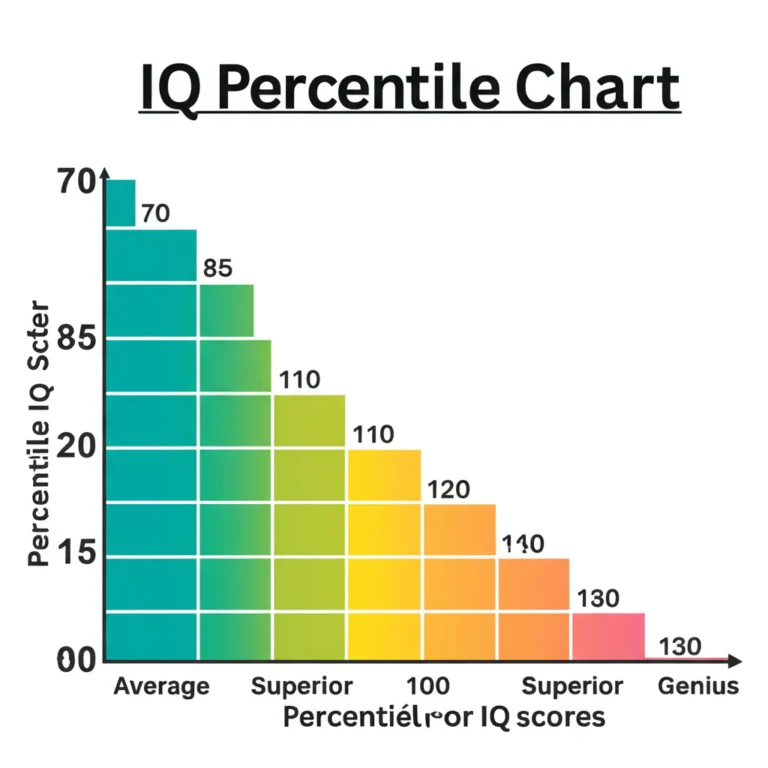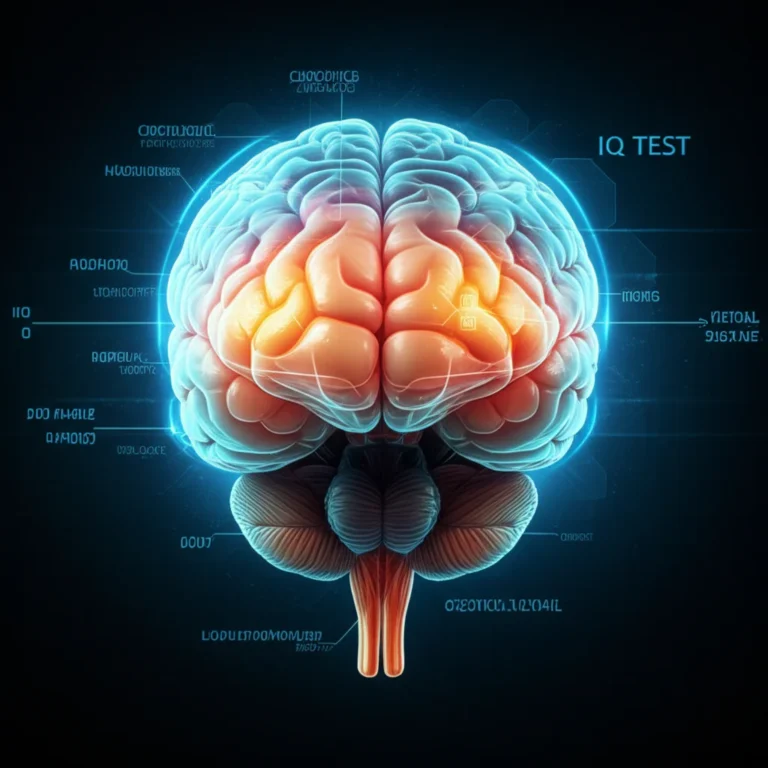Support our educational content for free when you buy through links on our site. Learn more
How Do I Check My IQ? 10 Insightful Ways to Discover Your Intelligence in 2024 🧠
Have you ever wondered how your brain stacks up against others? 🤔 You’re not alone! IQ tests have intrigued people for decades, often sparking debates about intelligence and potential. Imagine sitting down for a test that could unlock the mysteries of your cognitive abilities—how cool would that be? In this article, we’ll explore 10 engaging ways to check your IQ, from fun online quizzes to professional assessments. You’ll gain insights into what your score means and how it can influence your education and career choices.
Did you know that the average IQ score is around 100? But what does that really mean for you? As you read on, you’ll discover not only how to check your IQ but also how to enhance it. So, grab a cup of coffee, get comfy, and let’s dive into the fascinating world of IQ testing!
Key Takeaways
- Understanding IQ: IQ stands for Intelligence Quotient, measuring cognitive abilities relative to others.
- Testing Options: Explore 10 different ways to check your IQ, including both online tests and professional assessments.
- Interpreting Scores: Learn what your IQ score means and how it can impact your life choices.
- Myths Debunked: Discover common misconceptions about IQ testing and its implications.
- Enhancing Intelligence: Get tips on improving your cognitive skills through practical exercises and lifestyle choices.
Ready to take the plunge? 👉 Shop IQ test preparation books and brain games on Amazon to kickstart your journey! Shop IQ Test Preparation Books | Shop Brain Games
Table of Contents
- Quick Tips and Facts
- Understanding IQ: What Does It Really Mean?
- The Evolution of IQ Testing: A Historical Perspective
- How to Check Your IQ: Step-by-Step Guide
- Top Online IQ Tests to Consider
- What to Expect from an IQ Test
- Interpreting Your IQ Score: What It Means for You
- Common Myths About IQ Testing Debunked
- The Role of IQ in Education and Career Choices
- Enhancing Your Cognitive Abilities: Tips and Tricks
- Insights from the Community: Real Experiences
- Explore Related Topics: Broaden Your Knowledge
- Conclusion
- Recommended Links
- FAQ
- Reference Links
Quick Tips and Facts
Welcome to the world of IQ testing! Let’s dive into some quick tips and facts that will make you the life of the party—or at least the trivia night! 🎉
- IQ stands for Intelligence Quotient and is a measure of a person’s intellectual abilities relative to others. It’s like a mental fitness test, but with fewer burpees.
- Average IQ is around 100. So, if you’re scoring higher, give yourself a pat on the back! If lower, remember, it’s just one aspect of intelligence.
- IQ tests can vary, from the Stanford-Binet to the Wechsler Adult Intelligence Scale. Each measures different aspects of intelligence, like problem-solving and reasoning.
- Online IQ tests are available for quick assessments, but for a more accurate measure, a professionally administered test is recommended. Check out our Free IQ Tests for a starting point.
- Famous brains like Albert Einstein are estimated to have had an IQ of around 160, but remember, he never actually took a test. So, you might be the next Einstein!
- IQ isn’t everything. Emotional intelligence, creativity, and practical skills are just as important in the grand tapestry of life.
Now that we’ve wet your whistle with these tidbits, let’s get into the nitty-gritty of IQ testing. Ready? Let’s go!
Understanding IQ: What Does It Really Mean?
IQ might seem like a three-letter enigma, but it’s actually a fascinating concept! 🤔
What is IQ?
IQ, or Intelligence Quotient, is a score derived from standardized tests designed to measure human intelligence. According to Verywell Mind, it evaluates a range of cognitive abilities and provides a score that is intended to serve as a measure of an individual’s intellectual capabilities.
How is IQ Measured?
IQ scores are typically measured using a bell curve, with a mean score of 100 and a standard deviation of 15. This means most people score between 85 and 115. Here’s a quick table to visualize this:
| IQ Score Range | Classification |
|---|---|
| 1-24 | Profound mental disability |
| 25-39 | Severe mental disability |
| 40-54 | Moderate mental disability |
| 55-69 | Mild mental disability |
| 70-84 | Borderline mental disability |
| 85-114 | Average intelligence |
| 115-129 | Above average or bright |
| 130-144 | Moderately gifted |
| 145-159 | Highly gifted |
| 160-179 | Exceptionally gifted |
| 180 and up | Profoundly gifted |
The Importance of IQ
IQ is often used in education and career planning, but remember, it’s just one piece of the puzzle. As Fazil Azmaan aptly put it, “It’s not about mental intelligence, it’s about mental fitness.”
The Evolution of IQ Testing: A Historical Perspective
Let’s take a stroll down memory lane and see how IQ testing has evolved over the years. 🚶♂️
The Birth of IQ Testing
IQ testing began in the early 20th century with Alfred Binet, who developed the first modern intelligence test to identify students needing special assistance in schools. His work laid the foundation for future tests.
The Rise of Different IQ Tests
Over the years, various tests have been developed, including the Stanford-Binet and the Wechsler scales. Each has its unique approach to measuring intelligence. The Stanford-Binet test, for example, focuses on fluid reasoning, knowledge, quantitative reasoning, visual-spatial processing, and working memory.
Modern IQ Testing
Today, IQ tests are used worldwide for various purposes, from educational assessments to employment screenings. Online platforms like MentalUP offer quick and convenient tests, though they might not be as comprehensive as professional assessments.
How to Check Your IQ: Step-by-Step Guide
Ready to embark on your IQ testing journey? Here’s how you can check your IQ, step by step. 🧗♀️
Step 1: Determine Your Purpose
Why do you want to check your IQ? Is it for personal curiosity, educational purposes, or career planning? Knowing your purpose will help you choose the right test.
Step 2: Choose the Right Test
- Professional Tests: Administered by licensed psychologists for a comprehensive assessment.
- Online Tests: Quick and convenient, but ensure they are from reputable sources. Check out our Free IQ Tests for some reliable options.
Step 3: Prepare for the Test
- Get a Good Night’s Sleep: Rested minds perform better.
- Eat a Healthy Meal: Fuel your brain with nutritious food.
- Stay Calm: Stress can affect your performance. Take deep breaths and relax.
Step 4: Take the Test
Follow the instructions carefully and answer each question to the best of your ability. Remember, it’s not a race!
Step 5: Interpret Your Results
Once you have your score, use it as a tool for self-improvement. Whether you’re a budding genius or an average Joe, there’s always room to grow!
Top Online IQ Tests to Consider
Online IQ tests have become popular for their convenience and accessibility. Here are some top contenders you might want to try. 🌐
1. Mensa Workout
Mensa offers a free online IQ test that gives you a taste of their official test. It’s a fun way to challenge yourself and see where you stand.
2. 123Test
123Test provides a variety of IQ tests, including a classic IQ test and a culture fair intelligence test. They offer detailed results and insights into your cognitive abilities.
3. Free IQ Test
Our Free IQ Tests provide a quick assessment of your intellectual abilities with instant results. Perfect for a quick brain workout!
4. MentalUP
MentalUP offers a scientifically designed IQ test with detailed reports and tips for improvement. It’s a great option for those looking to enhance their cognitive abilities.
👉 CHECK PRICE on:
What to Expect from an IQ Test
Taking an IQ test can be an exciting, albeit nerve-wracking, experience. Here’s what you can expect. 🎢
Types of Questions
IQ tests typically include questions that assess various cognitive skills, such as:
- Logical Reasoning: Can you spot patterns and solve puzzles?
- Verbal Comprehension: How well do you understand language and vocabulary?
- Perceptual Reasoning: Can you interpret visual information?
- Mathematical Reasoning: Are you a numbers whiz?
Test Format
Most IQ tests are multiple-choice and timed. You’ll need to think quickly and accurately. But don’t worry, it’s not about getting every question right—it’s about doing your best!
Test Environment
For professional tests, expect a quiet, controlled environment. Online tests can be taken at home, but make sure you’re free from distractions.
Interpreting Your IQ Score: What It Means for You
So, you’ve taken the test, and now you have a shiny new IQ score. But what does it mean? 🤨
Understanding Your Score
Your IQ score is a snapshot of your cognitive abilities at a given time. It doesn’t define you but can provide insight into your strengths and areas for improvement.
IQ Score Ranges
Refer back to our table in the “Understanding IQ” section for a breakdown of what different scores mean. Remember, most people fall within the “average” range, and that’s perfectly okay!
The Bigger Picture
IQ is just one measure of intelligence. Emotional intelligence, creativity, and practical skills are equally important. Use your score as a tool for growth, not a label.
Common Myths About IQ Testing Debunked
IQ testing is surrounded by myths and misconceptions. Let’s set the record straight! 🕵️♂️
Myth 1: IQ is Fixed
Fact: IQ can change over time, especially in childhood and adolescence. Engaging in brain-training activities and lifelong learning can help improve your cognitive abilities.
Myth 2: High IQ Equals Success
Fact: While a high IQ can be advantageous, it’s not the only predictor of success. Emotional intelligence, perseverance, and social skills play significant roles.
Myth 3: IQ Tests Measure All Types of Intelligence
Fact: IQ tests primarily measure analytical and problem-solving skills. They don’t capture creativity, emotional intelligence, or practical skills.
Myth 4: Online IQ Tests Are Inaccurate
Fact: While some online tests can be less reliable, reputable platforms like MentalUP offer accurate assessments.
The Role of IQ in Education and Career Choices
IQ can play a role in shaping your educational and career paths. Let’s explore how. 🎓
Educational Implications
- Identifying Giftedness: High IQ scores can indicate intellectual giftedness, leading to specialized educational programs.
- Diagnosing Learning Disabilities: Low IQ scores can help identify learning disabilities, allowing for tailored support.
Career Planning
- Job Suitability: Certain professions may require higher cognitive abilities, and IQ tests can help assess suitability.
- Career Advancement: Understanding your strengths can guide you in choosing a career path that aligns with your abilities.
A Balanced Perspective
Remember, IQ is just one factor in education and career success. Passion, hard work, and perseverance are equally important.
Enhancing Your Cognitive Abilities: Tips and Tricks
Want to boost your brainpower? Here are some tips and tricks to enhance your cognitive abilities. 🧠
Tip 1: Stay Curious
Engage in lifelong learning by exploring new topics, reading books, and taking courses. Curiosity keeps your brain active and sharp.
Tip 2: Exercise Regularly
Physical activity increases blood flow to the brain and improves cognitive function. So, get moving!
Tip 3: Practice Mindfulness
Mindfulness and meditation can reduce stress and improve focus and concentration. Try incorporating these practices into your daily routine.
Tip 4: Play Brain Games
Games like Sudoku, chess, and crosswords challenge your brain and enhance problem-solving skills. Check out our IQ Test Preparation for more brain-boosting activities.
Tip 5: Maintain a Healthy Diet
A balanced diet rich in omega-3 fatty acids, antioxidants, and vitamins supports brain health. Don’t forget to hydrate!
Insights from the Community: Real Experiences
Let’s hear from real people who have taken IQ tests and what they’ve learned from the experience. 🗣️
Personal Story: Jane’s Journey
Jane, a school teacher, took an IQ test to better understand her cognitive strengths. “The test revealed I had strong verbal skills, which explained why I excel in language arts. It also highlighted areas for improvement, like spatial reasoning. I’ve been working on puzzles and games to enhance those skills.”
Personal Story: Tom’s Tale
Tom, an engineer, took an online IQ test out of curiosity. “I was surprised by my high score in problem-solving, which made me more confident in my job. However, I realized that emotional intelligence is just as crucial, so I’ve been focusing on developing those skills too.”
Community Insights
Many people find that taking an IQ test provides valuable insights into their cognitive abilities, helping them make informed decisions about education and career paths.
Explore Related Topics: Broaden Your Knowledge
Curious to learn more? Here are some related topics to explore. 📚
- Famous IQ Scores: Discover the IQ scores of well-known personalities.
- Children’s IQ Tests: Learn about IQ testing for kids and how it can benefit their education.
- IQ Test FAQ: Find answers to common questions about IQ testing.
Stay curious and keep exploring the fascinating world of intelligence!
Now that you’re armed with all this knowledge, are you ready to take the plunge and test your IQ? Let’s see what you’re made of! 🧩
Conclusion

In summary, checking your IQ can provide valuable insights into your cognitive abilities and help guide your educational and career choices. Whether you opt for a professional test or a quick online assessment, understanding your IQ can be an enlightening experience.
Positives and Negatives of Online IQ Tests
Positives:
- Convenience: Online tests are easily accessible and can be taken from the comfort of your home.
- Instant Results: Many platforms provide immediate feedback, allowing you to gauge your abilities quickly.
- Variety: There are numerous tests available, catering to different cognitive skills and preferences.
Negatives:
- Accuracy: Not all online tests are scientifically validated, which may affect the reliability of the results.
- Limited Scope: Many online tests focus on specific types of intelligence, missing out on a holistic view of cognitive abilities.
- Distractions: Taking a test at home can lead to interruptions that might skew your results.
Overall, while online IQ tests can be a fun and informative way to check your cognitive abilities, for a more comprehensive evaluation, consider seeking a professional assessment.
We confidently recommend trying out the tests from reputable sources like MentalUP or 123Test for a more accurate measure of your IQ.
Recommended Links
- 👉 Shop IQ Test Preparation Books on Amazon:
FAQ

How do I calculate my IQ?
Calculating your IQ typically involves taking a standardized test that measures various cognitive abilities. The most common formula used is:
[ \text{IQ} = \left( \frac{\text{Mental Age}}{\text{Chronological Age}} \right) \times 100 ]
However, most modern tests use complex algorithms to derive scores based on performance across multiple sections.
Read more about “Discover Your IQ: 10 Best Online IQ Tests for 2024 🧠”
How can I test my IQ by myself?
You can test your IQ by taking online IQ tests available on various platforms. Look for reputable sites like MentalUP or 123Test that offer scientifically designed assessments. Remember to choose a test that provides a detailed report and insights into your cognitive abilities.
What was Albert Einstein’s IQ?
Albert Einstein’s IQ is estimated to be between 160 and 190, although he never officially took an IQ test. His genius is often attributed to his exceptional problem-solving abilities and creativity, which are not fully captured by IQ tests alone.
Read more about “The Ultimate IQ Score Chart by Age: Discover What Your Score Really Means! … 🧠✨”
Is 137 IQ good?
Yes, a score of 137 is considered above average and falls into the “gifted” category. It indicates strong cognitive abilities and problem-solving skills, which can be advantageous in both academic and professional settings.
Read more about “Is 121 a Good IQ for a 12-Year-Old? 7 Things Every Parent Should Know … 🤔”
Can I improve my IQ score?
Yes! While IQ is often thought to be fixed, research suggests that engaging in brain-training activities, learning new skills, and maintaining a healthy lifestyle can positively impact cognitive abilities. Activities like puzzles, memory games, and even meditation can help enhance your mental agility.
Read more about “Discover Your True Potential: The Ultimate Guide to the Real IQ Test … 🧠✨”
Are online IQ tests accurate?
The accuracy of online IQ tests varies. Some are designed by psychologists and can provide reliable results, while others may lack scientific validation. Always choose tests from reputable sources to ensure you’re getting a fair assessment of your abilities.
Read more about “Want to Know Your IQ? 🧠 10 Things You Need to Know About Quick IQ Tests …”
What types of questions are on an IQ test?
IQ tests typically include a mix of logical reasoning, verbal comprehension, mathematical reasoning, and perceptual reasoning questions. These assess different aspects of cognitive functioning, from problem-solving to language skills.
Reference Links
- Mensa International
- Verywell Mind – What is a Genius IQ Score?
- MentalUP Blog on Free Online IQ Test
- 123Test
By exploring these resources, you can deepen your understanding of IQ testing and its implications. Happy testing! 🧠✨






